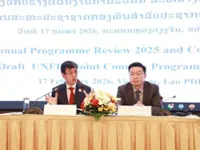PETALING JAYA: Women, especially those in the informal sector, continue to bear a disproportionate burden of caregiving, often at the expense of their careers, say women’s rights advocates.
At a forum, Polity executive chairman Nurul Izzah Anwar called for greater recognition of the care economy and structural support to ensure women aren't forced to choose between family and livelihood.
“Most women are expected to give up their jobs when caregiving responsibilities arise — whether for children or elderly parents.
“But caregiving is a form of economic contribution. We need policies that acknowledge and support this work,” she said in a pre-recorded interview on Saturday (May 10).
The forum - titled “From Boardrooms to Homefront: Women Leaders on Navigating Work, Leadership, and Caregiving” - was organised by All Women's Action Society (Awam).
Other speakers included Universiti Malaya’s Dr Shanthi Thambiah, Awam deputy president Amanda Kong, and Malaysian Association of Sustainable Supply Chain and Innovation president Datin Lorela Chia.
Nurul Izzah stressed that women in the informal sector are particularly vulnerable, facing limited job security, no paid leave, and little access to affordable childcare.
“We talk about productivity and growth, but we ignore the invisible backbone - the women holding it all together,” she said.
She also emphasised the importance of treating all women professionals, including divorcees and single mothers, with respect and professionalism.
“As a divorcee in public life, I’ve faced assumptions that my marital status made me vulnerable or in search of a partner. It’s unacceptable. Professional spaces must be free from such bias,” she added.
She urged society to foster environments where boundaries are respected and individuals feel empowered to speak out against inappropriate behaviour.
“Often, women are made to feel embarrassed for asserting their boundaries. We need to change that narrative. Recognising and responding to predatory behaviour isn’t rude - it’s responsible.”
She said teaching young people to identify and reject inappropriate conduct must begin early, both at home and in schools.
“We cannot expect change if we only intervene at adulthood. Respect and equality must be cultivated from a young age,” she said.
Calling for systemic reform, Nurul Izzah said Malaysia must expand support for caregiving, including better regulation of childcare centres and improved access to eldercare.
Adding to the call for reform, Universiti Malaya gender studies lecturer Dr Shanthi Thambiah said Malaysia must urgently reconsider how care work is distributed and valued.
“We need to actually talk about redistributing. We need to talk about reducing the burden that’s been ongoing and we need to reward the women who are taking on half of the burden at the moment,” she said.
She warned that leaving women to shoulder caregiving alone, especially with demographic changes, could have dire consequences.
“It’s not just the responsibility of one woman. It’s not an individual responsibility, and with the demographic shifts that are taking place in Malaysia, if we don’t change the norms that govern care, we are going to head into a situation of crisis.
“If we think roads and public transportation are important, care infrastructures are much more important infrastructures to invest in,” she added.





